Filter by
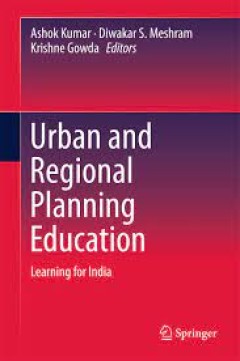
Urban and Regional Planning Education Learning for India
This is the first volume exclusively dedicated to planning education, with a focus on India and learning from global experiences for India. Prior to the 1990s, planning education in India was largely confined to national and local economic concerns. Within a globalized scenario, such pedagogies and theories have become outmoded. With new concerns emerging in planning, new pedagogical tools and …
- Edition
- -
- ISBN/ISSN
- 978-981-10-0608-1
- Collation
- -
- Series Title
- -
- Call Number
- -
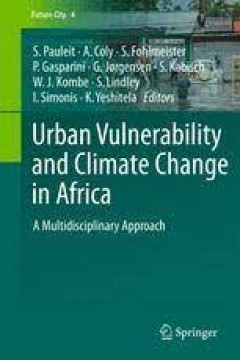
Urban Vulnerability and Climate Change in Africa A Multidisciplinary Approach
Urbanisation and climate change are among the major challenges for sustainable development in Africa. The overall aim of this book is to present innovative approaches to vulnerability analysis and for enhancing the resilience of African cities against climate change-induced risks. Locally adapted IPCC climate change scenarios, which also consider possible changes in urban population, have been …
- Edition
- -
- ISBN/ISSN
- 978-3-319-03982-4
- Collation
- -
- Series Title
- -
- Call Number
- -
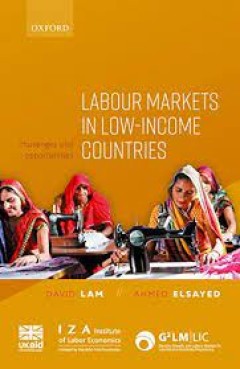
Labour Markets in Low-Income Countries Challenges and Opportunities
Employment and job creation are key components in achieving economic growth and sustainable development, particularly in low-income countries. The growing size of the working-age population in many developing regions underscores the need to further strengthen labour market structures in the world’s poorest countries. Despite the importance of studying emerging labour markets, and investigatin…
- Edition
- -
- ISBN/ISSN
- 9780192897107
- Collation
- -
- Series Title
- -
- Call Number
- -
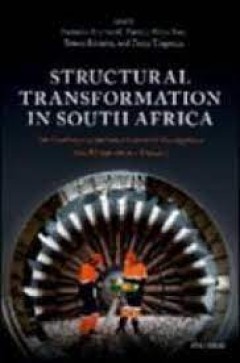
Structural Transformation in South Africa The Challenges of Inclusive Indust…
Taking South Africa as an important case study of the challenges of structural transformation, the book offers a new micro-meso level framework and evidence linking country-specific and global dynamics of change, with a focus on the current challenges and opportunities faced by middle-income countries. Detailed analyses of industry groupings and interests in South Africa reveal the complex set …
- Edition
- -
- ISBN/ISSN
- 9780192894311
- Collation
- -
- Series Title
- -
- Call Number
- -
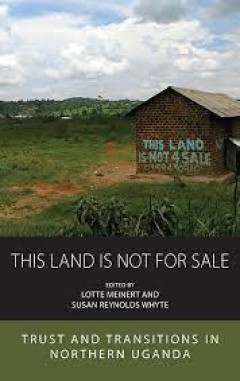
This Land Is Not For Sale Trust and Transitions in Northern Uganda
Although violent conflict has declined in northern Uganda, tensions and mistrust concerning land have increased. Residents try to deal with acquisitions by investors and exclusions from forests and wildlife reserves. Land wrangles among neighbours and relatives are widespread. The growing commodification of land challenges ideals of entrustment for future generations. Using extended case studie…
- Edition
- -
- ISBN/ISSN
- 9781805390473
- Collation
- -
- Series Title
- -
- Call Number
- -
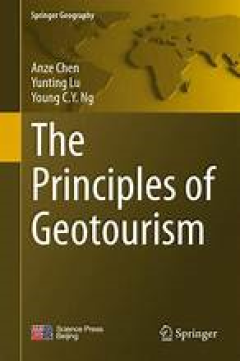
The Principles of Geotourism
The book introduces tourism earth-science as a new scientific discipline by applying the principles of earth-science in the study of natural and human tourism resources. It involves studying the geo-scientific characteristics of these tourism resources through surveys, evaluation and aesthetic value assessment. It also discusses about the principles behind geopark establishment and management. …
- Edition
- 1
- ISBN/ISSN
- 978-3-662-46697-1
- Collation
- XXIII, 264, 7 illustrations in colour
- Series Title
- Springer Geography
- Call Number
- -
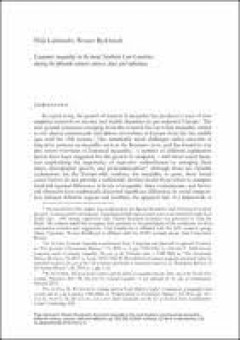
Chapter Economic inequality in the rural Southern Low Countries during the Fi…
This chapter seeks to explore local and regional variation in levels of inequality in different types of rural localities and regions within the late medieval County of Flanders. Our research indicates that fiscal sources for the County of Flanders can produce reliable data on the distribution of income during the late medieval period. The analysis of these data shows that important local and r…
- Edition
- -
- ISBN/ISSN
- 9788855180535
- Collation
- -
- Series Title
- -
- Call Number
- -

Tourism in Latin America Cases of Success
This book presents eleven case studies of success about Latin America tourism. The cases are embedded in a framework describing the economic and cultural foundations of tourism development in the continent. Mexico, Brazil, Chile and Costa Rica are some of the Latin countries which have become examples and models for touristic development, respect for the environment and social inclusion. The bo…
- Edition
- -
- ISBN/ISSN
- 978-3-319-05735-4
- Collation
- -
- Series Title
- -
- Call Number
- -
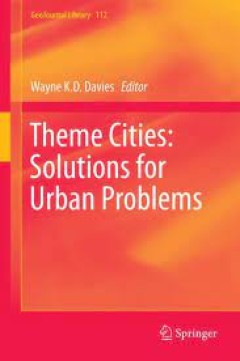
Theme Cities: Solutions for Urban Problems
This book reviews a series of new urban ideas or themes designed to help make cities more liveable, sustainable, safe and inclusive. Featuring examples drawn from cities all over the world, the various chapters provide critical assessments of each of the various approaches and their potential to improve urban life. New Urbanism: creating new areas based on a more humane scale with neighbourh…
- Edition
- -
- ISBN/ISSN
- 978-94-017-9655-2
- Collation
- -
- Series Title
- -
- Call Number
- -
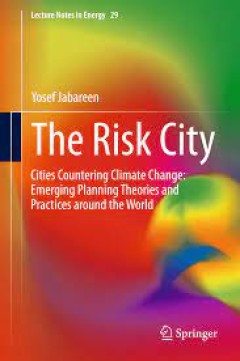
The Risk City Cities Countering Climate Change: Emerging Planning Theories a…
Contemporary cities face phenomenal risks, and they face particularly high levels of mounting social and environmental risks, including social polarization, urban conflicts, riots, terror, and climate change threats. This book suggests that climate change and its resulting uncertainties challenge the concepts, procedures, and scope of conventional approaches to planning, creating a need to reth…
- Edition
- -
- ISBN/ISSN
- 978-94-017-9768-9
- Collation
- -
- Series Title
- -
- Call Number
- -
 Computer Science, Information & General Works
Computer Science, Information & General Works  Philosophy & Psychology
Philosophy & Psychology  Religion
Religion  Social Sciences
Social Sciences  Language
Language  Pure Science
Pure Science  Applied Sciences
Applied Sciences  Art & Recreation
Art & Recreation  Literature
Literature  History & Geography
History & Geography